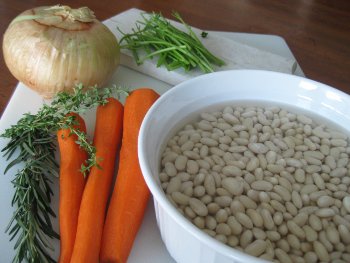The beginning of a new year is upon us making it a great time to re-evaluate, set goals (some we'll keep and some we already haven't), and think about all that this coming year could be. It's an optimistic time, with the year in such an unblemished state, and thanks to cook and writer Tamar Adler's recent book, An Everlasting Meal , I'm feeling especially excited about the year of cooking that's stretched out before me.
An Everlasting Meal is less a cookbook with page after page of recipes, and more a book full of the author's thoughts about her favorite ways to feed, and even spiritually nourish, people with great food that is made simply and with the humblest of ingredients. From the introduction:
This is not a cookbook or a memoir or a story about one person or one thing. It is a book about eating affordably, responsibly, and well, and because doing so relies on cooking, it is mostly about that... It doesn't contain "perfect" or "professional ways to do anything, because we don't need to be professionals to cook well, any more than we need to be doctors to treat bruises or scrapes: we don't need to shop like chefs or cook like chefs; we need to shop and cook like people learning to cook, like what we are -- people who are hungry.
In the introduction, Adler says that her book is fashioned after famous food writer M.F.K. Fisher's book, How to Cook a Wolf, a book written to encourage World War II era cooks to prepare the best food possible, even when food was rationed and pantries were often bare. Fisher's book wasn't strictly a cookbook, either, but was about "living well, in spite of lack."
Both How to Cook a Wolf and An Everlasting Meal are full of ideas for cooks with limited resources, but their intelligent, witty writing make them more than just practical cooking manuals. Take the chapter titles, for example: M.F.K. Fisher's book has section titles like ''How to Be Cheerful Though Starving'' and ''How to Have a Sleek Pelt.'' Tamar Adler's book has "How to Boil Water" (an improbable ode to boiling) , "How to Catch Your Tail" (about making things from the tail ends of things), and "How to Light a Room" (how to use herbs to perk up your food or to actually BE your food).
My favorite section in An Everlasting Meal is one called "How to Live Well" where she describes the best ways to cook and eat beans. I love beans, but I have tended to love them mostly because they enable me to feed my family for almost nothing. Tamar Adler has helped me get over seeing beans as merely cheap and has given me ideas for cooking and serving beans that seem thoroughly decadent (usually containing joyfully immoderate amounts of olive oil). From "How to Live Well":
Warm cooked beans in a little pan. Add sautéed kale, or roasted squash, or a little bit of roasted tomato, or add nothing at all. Crack an egg or two into the beans, cover the pan, and cook. If you have stale bread, put a toasted piece, rubbed with garlic, in each bowl. Spoon the beans and egg over the toast, salt each egg, grind it with fresh black pepper, drizzle the beans and egg copiously with olive oil, grate them thickly with Parmesan, and dine like a Roman plebeian, or a Tuscan pauper, prince, or pope.
Does that not make you want to sprint to your kitchen to create sumptuous bean dishes and give delight to all you feed? The amazing thing is this book is full of these kind of passages, riddled with ideas and opportunities for creativity that will make cooking less of an "obstacle" and remind us that it's "among the most human things we do."
I'll return to An Everlasting Meal over and over, especially at the start of new years and seasons, because it reminds me why I began to love to cook in the first place: "When we cook things, we transform them." There's so much pleasure in being able to take things from one state and transform it into something different, something that you want: flour and butter into a flaky crust, a bunch of parsley into a healthy soup, an egg from liquid to solid in the shell or out. Adler seems to know my mind exactly when she writes: "we feel, when we exert tiny bits of our human preference in the universe, more alive." And, I would add, we feel more like who we are meant to be. This seems like a great way to start a year.
Post originally published at Space & Thyme
Photos belong to Monica Strawbridge.
